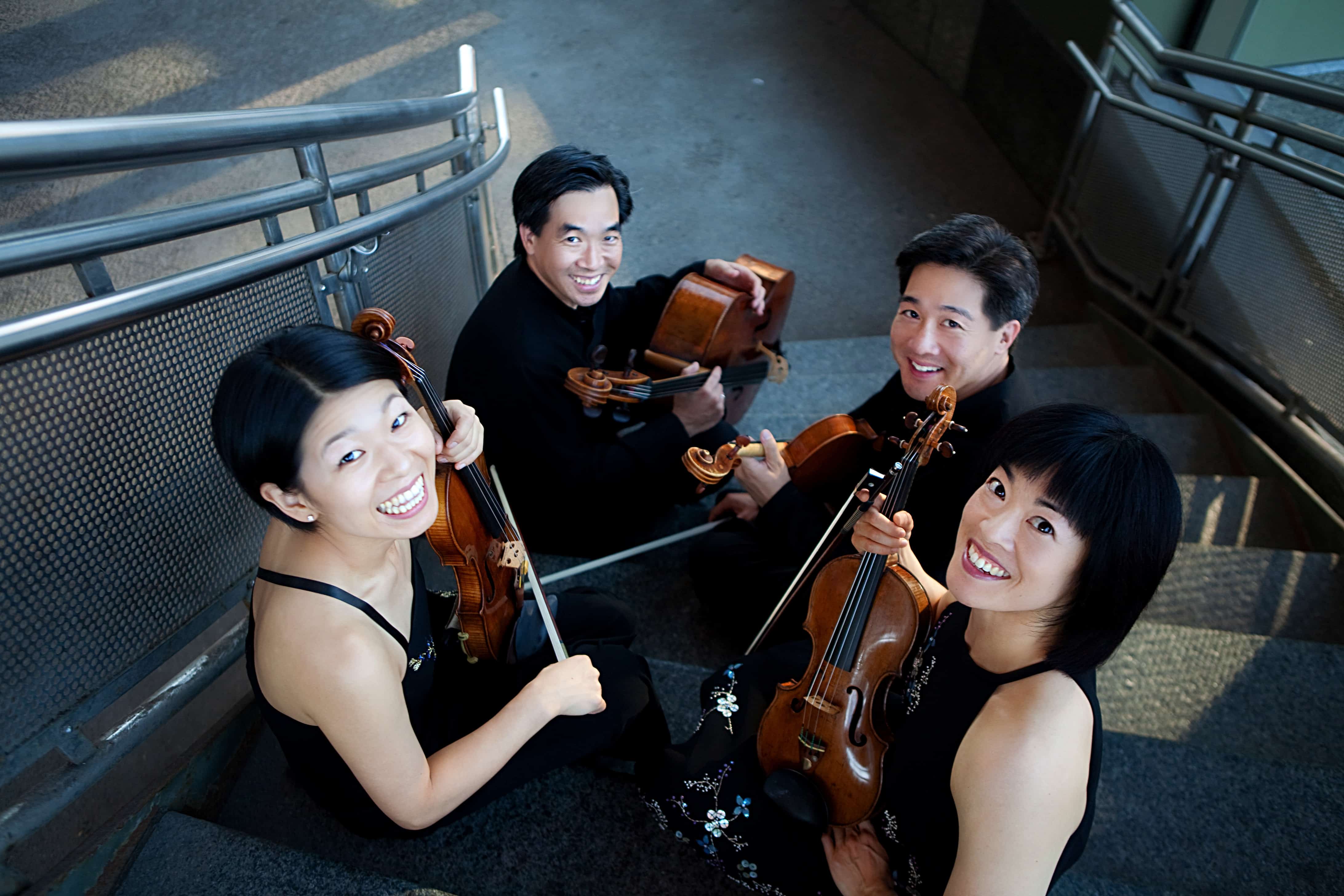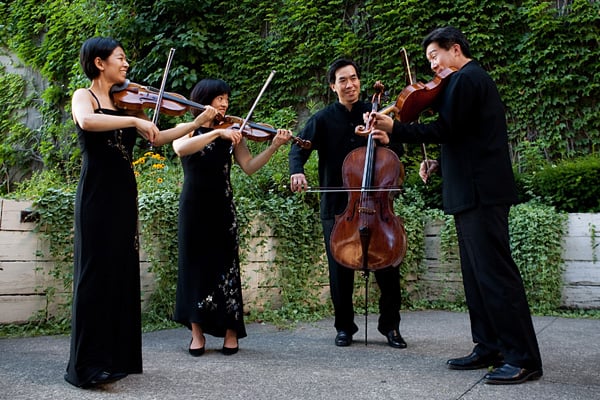In preparation for their upcoming Music at Kohl Mansion performance, Ying String Quartet violist Phillip Ying took some time to talk with MAKM Honorary Chair Sandy Wilson of the Alexander String Quartet.
Sandy Wilson: This is a particularly exciting season for Music at Kohl Mansion and our audiences are really looking forward to your program on November 11th. Can you give us any insights into the thematic connection between these lovely Italian gems, and if possible, how you feel Schubert’s Death and the Maiden compliments and leavens the mix? Are there any thoughts you could share from your perspective as the performers that you would like to suggest to the audience as we prepare for the concert?
Phillip Ying: In our lighter moments, we refer to this upcoming program as, “The Voice.” This is of course a reference to the popular tv show (and I admit that I’m a big fan, too!) and it is the key element that brings the three works on the program together. Puccini and Verdi are known as opera composers, and it is rare and delightful to have a string quartet to perform from each of them. As much as possible, we aim for a very vocal approach to these instrumental works, singing with our instruments as much and wherever possible, and aspiring to the quality of the most beautiful instrument in the world: the human voice. Though Schubert is known for many, many wonderful instrumental works, at the heart of his entire oeuvre are the hundreds of incredible songs or lieder. Many listeners find Schubert’s true genius in the works that he wrote for voice. We have chosen his well-known string quartet nicknamed, “Death and the Maiden,” to close the program. This quartet, in particular the theme and variations in the second movement, is based on material from his song of the same name.
Wilson: That’s a really terrific premise and now that you’ve piqued my interest, I’m going to have to make more time for TV! I am personally particularly excited about the Verdi. Although the ASQ has at one time performed all of these works, only the Verdi failed get a big “thumbs up” from my colleagues. Consequently we have not returned to it. I think I may recall something about Arnold Steinhardt’s frustration with his Guarneri colleagues about this the work too so I wonder how the Ying has come to champion this admittedly rather obscure piece?
Ying: Verdi is coming up on his 200th birthday in 2013, so it’s a good time to celebrate his work. I think it’s quite lucky that we even have a string quartet from him. Apparently it was written only because a production delay of his opera, Aida, gave him a few days off, so he used that time to write a string quartet! It may be because of this that the work on the whole tends to be much more delightful and charming than serious and profound. There is plenty of the beautiful and melodic writing that you would expect from Verdi, but he liberally throws in dashes of brilliant instrumental virtuosity. We programmed it not only because of the anniversary of Verdi’s birth, but because our first violinist, Ayano, learned the quartet as a teenager and always loved it and wanted to come back to it.
Wilson: The opportunity to introduce and guide your colleagues to a much loved “blast from the past” is perhaps the best justification of all to return to an otherwise obscure work. The ASQ will revisit the Walton later this season with the same eager anticipation of introducing Zak to a cherished favorite. The Ying has an enviable reputation for its breadth of genre-busting work – your “walking on the wild side,” so to speak. Of your many stretches over two decades, which do you feel in hindsight has provided either the most surprising or lasting influence on your ongoing work? Conversely, are there any of your past efforts that, looking back you might not try again?
Ying: The experience that had the most lasting influence on us in our entire quartet career was the two years we spent living and playing music in Jesup, IA, population 2000. This was right at the beginning of our professional career, and the incredible challenge and reward of making music matter in the every day lives of people inspired a vision that sustains us even now. Since those years, in our commissioning, in our community engagement activities, in our performance partnership projects, in our collaborations with other artists, in our ventures into new technology, and in our multidisciplinary work, we always seek to create a powerful and meaningful connection between the listener and music, whether in or outside the traditional concert hall.
Our work with other musical artists has also been a huge privilege for us and has influenced us deeply. From Menahem Pressler to Billy Childs or the former Cleveland Quartet to the Turtle Island Quartet, we learn so much from the musical knowledge of these passionate and wise performers.
There have been some projects of ours that we would change if we could do it over again. For one of our more far-ranging collaborations, we performed with a Chinese noodle chef on stage together. While he hand pulled the noodles, we sought to make a musical connection with a piece that similarly drew out and wove musical lines by the wonderful composer, Chen Yi. It was an unexpected juxtaposition that we hoped would enhance the listening experience. In the end, however, I think it’s fair to say that the entertainmentvalue of the chef magically creating noodles with his bare hands the noodles out of a big ball of dough and flour flying through the air was so great that it was hard to also concentrate on the music!
Wilson: As you anticipate this trip to California, what activities are on your individual agendas – perhaps restaurants, or other treats that you look forward to when in Northern California?
Ying: We are naturally big fans of Asian food, especially Chinese food, so we always look forward to visiting California where the variety and quality of ethnic food is tremendous! This is a fairly quick trip for us with additional stops in NM, TX, and AZ, so we’ll be lucky to get in as many delicious meals as we can before heading back to our homes in Rochester, NY.
Wilson: Similar to your own situations as Ensemble in Residence at Eastman, the ASQ enjoys a similar position as Directors of the Morrison Chamber Music Center’s instructional program at SFSU. I wonder if you care to comment on the value and perspective you are able to afford your university students as an actively touring world-class ensemble? There are some sacrifices of course necessitated as your absences during touring take a toll on routine instructional schedules but how do the benefits outweigh this?
Ying: We are so excited when an institution like a university realizes the value in hiring a string quartet in residence, and it seems like gradually more and more of them are doing so! A string quartet is an ideal ensemble in many ways, first of all because ofthe incredible repertoire we can access from the masterpieces of Haydn and Mozart through Beethoven, Schubert, Mendelssohn, Dvorak, Brahms… the list goes on and on to include a fantastic number of new string quartets written every year. A string quartet can perform any one of these masterpieces in nearly any setting from a acoustically perfect concert hall to a hospital, a bank lobby, a civic club, a school classroom, the living room of a friend, and beyond—all you need are four chairs and four music stands! In addition, the string quartet can be an excellent collaborator with other artists and across disciplines, and can serve as leaders in the recent exploration of musical entrepreneurship. Where appropriate, a string quartet can serve as string and chamber music faculty members. We’re fortunate to enjoy a very satisfying and supportive residency at the Eastman School of Music where we interact with the amazingly creative Eastman students who along with their peers will be the future of music!
The Ying String Quartet Performs at Music at Kohl Mansion:
Sunday, November 11, 2012 – 7 pm
Ying Quartet
Verdi: String Quartet in E minor
Puccini: Crisantemi
Schubert: String Quartet in D minor “Death and the Maiden”
Pre-Concert Talk at 6 pm with Kai Christiansen
The Ying Quartet occupies a position of unique prominence in the classical music world, combining brilliantly communicative performances with a fearlessly imaginative view of chamber music in today’s world. Active in touring, commissioning and recording, the Ying enjoys a busy teaching schedule as quartet- in-residence at the Eastman School of Music. New first violinist Ayano Ninomiya joined the Quartet in 2010.
Purchase Music Kohl Mansion Tickets
Official Ying Quartet Website


